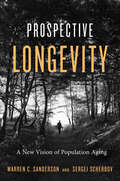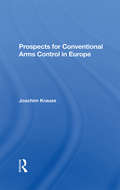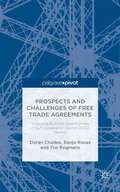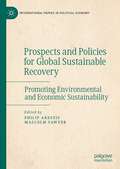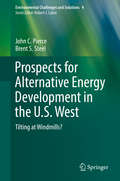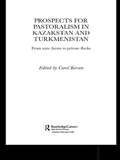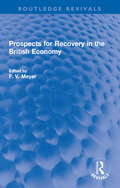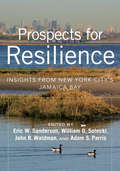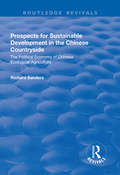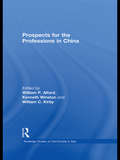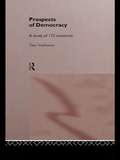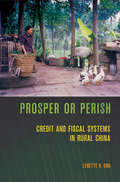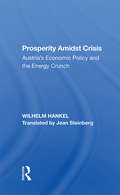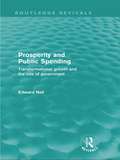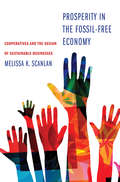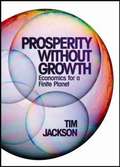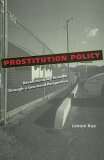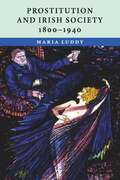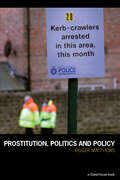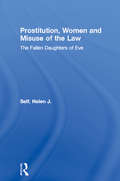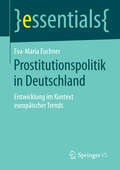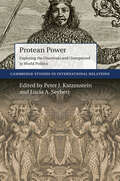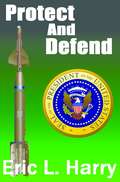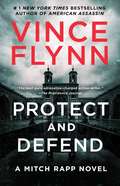- Table View
- List View
Prospect Theory and Foreign Policy Analysis in the Asia Pacific: Rational Leaders and Risky Behavior (Foreign Policy Analysis)
by Kai He Huiyun FengWhy does North Korea behave erratically in pursuing its nuclear weapons program? Why did the United States prefer bilateral alliances to multilateral ones in Asia after World War II? Why did China become "nice"—no more military coercion—in dealing with the pro-independence Taiwan President Chen Shuibian after 2000? Why did China compromise in the negotiation of the Chunxiao gas exploration in 2008 while Japan became provocative later in the Sino-Japanese disputes in the East China Sea? North Korea’s nuclear behavior, U.S. alliance strategy, China’s Taiwan policy, and Sino-Japanese territorial disputes are all important examples of seemingly irrational foreign policy decisions that have determined regional stability and Asian security. By examining major events in Asian security, this book investigates why and how leaders make risky and seemingly irrational decisions in international politics. The authors take the innovative step of integrating the neoclassical realist framework in political science and prospect theory in psychology. Their analysis suggests that political leaders are more likely to take risky actions when their vital interests and political legitimacy are seriously threatened. For each case, the authors first discuss the weaknesses of some of the prevailing arguments, mainly from rationalist and constructivist theorizing, and then offer an alternative explanation based on their political legitimacy-prospect theory model. This pioneering book tests and expands prospect theory to the study of Asian security and challenges traditional, expected-utility-based, rationalist theories of foreign policy behavior.
Prospective Longevity: A New Vision of Population Aging
by Warren C. Sanderson Sergei ScherbovWarren Sanderson and Sergei Scherbov argue for a new way to measure individual and population aging. Instead of counting how many years we’ve lived, we should think about our “prospective age”—the number of years we expect to have left. Their pioneering model can generate better demographic estimates, which inform better policy choices.
Prospects For Conventional Arms Control In Europe
by Joachim KrauseThis study is an attempt to examine the political, military and technical issues as well as the opportunities and pitfalls associated with conventional arms control in Europe, providing a short outline of the developments that have led to the renewed interest in conventional arms control since 1985.
Prospects and Challenges of Free Trade Agreements: Unlocking Business Opportunities in Gulf Cooperation Council (GCC) Markets
by Doren Chadee Banjo Roxas Tim RogmansThis book assesses the effectiveness of free trade agreements (FTAs) in unlocking international business opportunities in member states of the Gulf Cooperation Council (GCC). It takes an institutional perspective in explaining the existence and effects of non-tariff barriers and how FTAs can address these barriers to attract foreign investors.
Prospects and Policies for Global Sustainable Recovery: Promoting Environmental and Economic Sustainability (International Papers in Political Economy)
by Philip Arestis Malcolm SawyerThis book presents economic policies to combat the challenges posed by financial crisis, the COVID-19 pandemic, and the climate crisis. How the role of the markets, the state, and social cohesion have come into question is explored, alongside broader issues, such as inequality. Particular attention is given to policies relating to the funding and financing of investment to confront the climate emergency, enhancing productivity and technical innovation, the significance of the commons in the context of the state, and macroeconomic policies to underpin sustainability. This book aims to present a framework for a sustainable future, with policy suggestions that promote both environmental and economic sustainability. It will be relevant to students and researchers interested in the political economy and sustainable development.
Prospects for Alternative Energy Development in the U.S. West
by John C. Pierce Brent S. SteelThis book poses the question of whether identifiable individual-level attributes (e. g. , values, interests, knowledge, demographic characteristics) lead to support for or opposition to the development and implementation of alternative energy technologies. In recent years, attempts to site alternative energy technologies (e. g. , wind, solar, wave) have been met by intense opposition from a variety of sources, including many environmentalists from whom one might expect support for non-carbon based renewable energy initiatives. This volume argues that there are indeed such discernible attributes, and moreover that the identification and exploration are important for the development of support strategies for the well-informed and achievable siting of such technologies.
Prospects for Pastoralism in Kazakstan and Turkmenistan: From State Farms to Private Flocks (Central Asia Research Forum)
by Carol KervenThis collection traces how pastoralists have coped with the challenges of change in a part of the world with a long-tradition of livestock keeping. Their precarious position - balanced between a market system where only the fittest may survive, and their attempt to remain a human resource for the future development of the natural pastures and livestock industry - is carefully and critically examined by the contributors. The pastoralists' unique skills at managing livestock in a variable and challenging environment, and their ability to supply commodities much in demand mean that an understanding of their societal position is essential for anyone interested in transition in the former Soviet Union.
Prospects for Recovery in the British Economy (Routledge Revivals)
by F. V. MeyerFirst published in 1985, Prospects for Recovery in the British Economy examines the origins of the economic downturn of the early 1980s. The book explores the causes of the decrease in industrial production and employment during the early 1980s and considers the longer-term cyclical problems of the British economy. In doing so, it provides a detailed study on downturn and recovery from a variety of perspectives. Topics covered include the role of the financial markets; the decline in profitability and productivity in the manufacturing industry; and, the social implications of long-term trends. Prospects for Recovery in the British Economy is ideal for those with an interest in the history of the British economy and the history of economic thought.
Prospects for Resilience: Insights from New York City's Jamaica Bay
by William D. Solecki John R. Waldman Eric W. Sanderson Adam S. ParrisGiven the realities of climate change and sea-level rise, coastal cities around the world are struggling with questions of resilience. Resilience, at its core, is about desirable states of the urban social-ecological system and understanding how to sustain those states in an uncertain and tumultuous future. How do physical conditions, ecological processes, social objectives, human politics, and history shape the prospects for resilience? Most books set out "the answer." This book sets out a process of grappling with holistic resilience from multiple perspectives, drawing on the insights and experiences of more than fifty scholars and practitioners working together to make Jamaica Bay in New York City an example for the world.Prospects for Resilience establishes a framework for understanding resilience practice in urban watersheds. Using Jamaica Bay--the largest contiguous natural area in New York, home to millions of New Yorkers, and a hub of global air travel with John F. Kennedy International Airport--the authors demonstrate how various components of social-ecological systems interact, ranging from climatic factors to plant populations to human demographics. They also highlight essential tools for creating resilient watersheds, including monitoring and identifying system indicators; computer modeling; green infrastructure; and decision science methods. Finally, they look at the role and importance of a "boundary organization" like the new Science and Resilience Institute at Jamaica Bay in coordinating and facilitating resilience work, and consider significant research questions and prospects for the future of urban watersheds.Prospects for Resiliencesets forth an essential foundation of information and advice for researchers, urban planners, students and others who need to create more resilient cities that work with, not against, nature.
Prospects for Sustainable Development in the Chinese Countryside: The Political Economy of Chinese Ecological Agriculture (Routledge Revivals)
by Richard SandersThis title was first published in 2000: An examination of the potential for Chinese ecological agriculture providing a basis for sustainable development in the Chinese countryside. Richard Sanders involves primary research in seven villages and four countries in China that have adopted ecological agriculture. He examines the concept of sustainable development generally and analyses China’s political-economic policies towards the countryside since 1949, the impacts on the environment and the state of China’s environmental protection. The study addresses three main questions: 1. Is Chinese ecological agriculture worth adopting - specifically does CEA promise a form of sustainable rural development? 2. To the extent that it does, what are the social, political and economic conditions in the Chinese countryside which most favour its extension? 3. To the extent that these conditions are restrictive, what can the Chinese authorities do to make them less so and thus encourage its extension? The study concludes that the CEA, despite certain difficulties and problems, holds out the prospect of a more sustainable future for the rural economy than more usual forms of activity in the Chinese countryside. It finds that the conditions for adopting CEA are restrictive and that while the Chinese government is in favour of extending CEA it must reconsider questions of land management and ownership and assess long-term needs.
Prospects for the Professions in China (Routledge Studies on Civil Society in Asia)
by William P. AlfordProfessionals are a growing group in China and increasingly make their presence felt in governance and civil society. At the same time, however, professionals in the West are under increasing pressure from commercialism or scepticism about their ability to rise above self-interest. This book focuses on professionals in China and asks whether developing countries have a fateful choice: to embrace Western models of professional organization as they now exist, or to set off on an independent path, adapting elements of Western practices to their own historical and cultural situation. In doing so, the authors in this volume discuss a wealth of issues, including: the historic antecedents of modern Chinese professionalism; the implications of professionalism as an import in China; the impact of socialism, the developmental state and rampant commercialism on the professions in China; and the feasibility of liberal professions in an illiberal state. To conclude, the book considers whether there might be an emerging professionalism with Chinese characteristics, and how this might have an impact on the professions elsewhere. Prospects for the Professions in China will be of interest to students and scholars of Chinese Studies, law, sociology, medical studies and cultural studies.
Prospects of Democracy: A study of 172 countries
by Tatu VanhanenThis book provides the most extensive comparative survey of the state and conditions of democracy ever made. It focuses on 172 contemporary states, with historical data on the measures of democracy and on explanatory variables extending back to the 1850s. It presents a comprehensive exploration of democratization, its successes and failures, making predictions on the prospects for democracy for single countries and for seven regions of the world.As well as presenting empirical analyses of democratization on the basis of Vanhanens's resource distribution theory of democratization and making predictions on the prospects, the book includes contributions from five commentators, Mitchell A. Seligson on Latin America, Samuel Decalo and John W. Forje on Africa, John Henderson on Oceania and Ilter Turan on why some of the countires that pass Vanhanen's democratic threshold cannot in fact be seen as democracies. The volume also includes an introductory chapter which examines and compares other theoretical interpretations of democratization.Prospects for Democracy will be essential reading for all serious students of comparative politics and democracy.
Prosper or Perish: Credit and Fiscal Systems in Rural China
by Lynette H. OngThe official banking institutions for rural China are Rural Credit Cooperatives (RCCs). Although these co-ops are mandated to support agricultural development among farm households, since 1980 half of RCC loans have gone to small and medium-sized industrial enterprises located in, and managed by, townships and villages. These township and village enterprises have experienced highly uneven levels of success, and by the end of the 1990s, half of all RCC loans were in or close to default, forcing China's central bank to bail out RCCs. In Prosper or Perish, Lynette H. Ong examines the bias in RCC lending patterns, focusing on why the mobilization of rural savings has contributed to successful industrial development in some locales but not in others.Interweaving insightful and theoretically informed discussions of rural credit, development, governance, and bank bailouts, Ong identifies various sources for China's uneven development. In the highly decentralized fiscal environment of the People's Republic, successful industrialization has significant implications for rural governance. Local governments depend on revenue from industrial output to provide public goods and services; unsuccessful enterprises starve local governments of revenue and result in radical cutbacks in services. High peasant burdens, land takings without adequate compensation by local governments, and other poor governance practices tend to be associated with unsuccessful industrialization. In light of the recent liberalization of the rural credit sector in China, Prosper or Perish makes a significant contribution to debates within political science, economic development, and international banking.
Prosperity Amidst Crisis: Austria's Economic Policy And The Energy Crunch
by Wilhelm Hankel Jean SteinbergThis book deals with the exciting question of whether the world economic crisis can in fact be stopped only by a fight among all against all by forcing others to make painful adjustments in their demand, price, and employment levels.
Prosperity and Public Spending: Transformational growth and the role of government (Routledge Revivals)
by Edward NellIn a dramatic and well-argued challenge to the prevailing wisdom, Prosperity and Public Spending, first published in 1988, contends that the failure of Keynesian economics has been due to its timidity. Far from contracting, the government must expand its powers and activities, in order to achieve and maintain economic prosperity. The need for such expansion arises from the fact that the system has developed from a craft-based economy to a mass-production network with sophisticated international finance. This "transformational growth" brings about irreversible and sometimes devastating changes, requiring government action. Professor Nell argues that a lack of government action in the decade prior to the book’s initial publication was responsible for the stagnation of the economy and he asserts that this could only be overcome by a determined policy intervention and the political will to achieve dominance over private capital.
Prosperity in the Fossil-Free Economy: Cooperatives and the Design of Sustainable Businesses
by Melissa K ScanlanA blueprint for creating sustainable businesses, emphasizing the power and potential of cooperative models Drawing on both her extensive experience founding and directing social enterprises and her interviews with sustainability leaders, Melissa Scanlan provides a legal blueprint for creating alternate corporate business models that mitigate climate change, pay living wages, and act as responsible community members, including Certified B Corps and benefit corporations. With an emphasis on cooperatives, this book reveals the power and potential of cooperating as a unifying concept around which to design social enterprise achieving triple bottom-line results: for society, the environment, and finance.
Prosperity without Growth: Economics for a Finite Planet
by Tim JacksonIs more economic growth the solution? Will it deliver prosperity and well-being for a global population projected to reach nine billion? In this explosive book, Tim Jackson, a top sustainability adviser to the UK government, makes a compelling case against continued economic growth in developed nations. No one denies that development is essential for poorer nations. But in the advanced economies there is mounting evidence that ever-increasing consumption adds little to human happiness and may even impede it. More urgently, it is now clear that the ecosystems that sustain our economies are collapsing under the impacts of rising consumption. Unless we can radically lower the environmental impact of economic activity - and there is no evidence to suggest that we can - we will have to devise a path to prosperity that does not rely on continued growth. Economic heresy? Or an opportunity to improve the sources of well-being, creativity and lasting prosperity that lie outside the realm of the market? Tim Jackson provides a credible vision of how human society can flourish within the ecological limits of a finite planet. Fulfilling this vision is simply the most urgent task of our times. This book is a substantially revised and updated version of Jackson's controversial study for the Sustainable Development Commission, an advisory body to the UK Government. The study rapidly became the most downloaded report in the Commission's nine year history when it was launched earlier in 2009. 10% of the proceeds from the sale of this book will be donated to rainforest protection This paperback edition includes a new foreword by HRH The Prince of Wales
Prostitution Policy: Revolutionizing Practice through a Gendered Perspective
by Lenore KuoWhile widely acknowledged as the world's oldest profession, and often glamorized or demonized in the media, prostitution is a critical part of American culture and its economy, as well as a social problem in need of an updated public policy. In Prostitution Policy, Lenore Kuo combines feminist social research and legal studies to tackle issues raised by heterosexual prostitution in the U.S. Through the lens of feminist theory, Kuo examines the milieu of prostitutes and the role of prostitution in contemporary society, and how the interplay of those two works itself out in practice.Moving beyond theoretical analysis of prostitution, Prostitution Policy turns to the complicated problem of formulating a reasonable legal policy that minimizes harm. Kuo discusss criminalization, legalization, and decriminalization as possible approaches, ultimately arguing for a unique form of decriminalization including detailed legal oversight and mandatory social services.
Prostitution and Irish Society, 1800-1940
by Maria LuddyThis is the first book to tackle the controversial history of prostitution in Ireland in the nineteenth and early twentieth centuries. Maria Luddy uncovers the extent of prostitution in the country, how Irish women came to work as prostitutes, their living conditions and their treatment by society. She links discussions of prostitution to the Irish nationalist and suffrage movements of the late nineteenth and early twentieth centuries, analysing the ways in which Irish nationalism used the problems of prostitution and venereal disease to argue for the withdrawal of the British from Ireland. She also investigates the contentious history of Magdalen asylums and explores how the infamous red-light district of Dublin's 'Monto' was finally suppressed through the actions of the Legion of Mary in the 1920s. Revealing complex social and religious attitudes towards prostitution in Irish society, this book opens up a new world in Ireland's social and political history.
Prostitution, Politics & Policy
by Roger MatthewsProstitution has become an extremely topical issue in recent years and attention has focused both on the situation of female prostitutes and the adequacy of existing forms of regulation. Prostitution, Politics & Policy brings together the main debates and issues associated with prostitution in order to examine the range of policy options that are available. Governments in different parts of the world have been struggling to develop constructive policies to deal with prostitution – as, for example, the British Home Office recently instigated a £1.5 million programme to help address the perceived problems of prostitution. In the context of this struggle, and amidst the publication of various policy documents, Prostitution, Politics & Policy develops a fresh approach to understanding this issue, while presenting a range of what are seen as progressive and radical policy proposals. Much of the debate around prostitution has been polarized between liberals – who want prostitution decriminalized, normalized and humanized – and conservatives – who have argued that prostitution should be abolished. But, drawing on a wide range of international literature, and providing an overview that is both accessible to students and relevant to policy makers and practitioners, Roger Matthews proposes a form of radical realism that is irreducible to either of these two positions.
Prostitution, Women and Misuse of the Law: The Fallen Daughters of Eve
by Helen J. SelfThis is an examination, from a feminist historian's standpoint, of the background to the present system of regulating prostitution in Britain - which is generally admitted to be not only unjust and discriminatory, but ineffective even in achieving its stated aims. Concentrating on the 1950s, and especially on the Wolfenden Report and the 1959 Street Offences Act, it is a thorough exposure of the sexual double standard and general misogynist assumptions underlying legislation relating to prostitution. In addition to the detailed analysis of the 1950s legislation and the background to it, there is an exposition of the subsequent workings of the Act, and of attempts to amend or repeal it.
Prostitutionspolitik in Deutschland: Entwicklung im Kontext europäischer Trends (essentials)
by Eva-Maria EuchnerEva-Maria Euchner führt in das Thema der Prostitutionspolitik ein und stellt klassische Regulierungsregime sowie die zentralen Wertekonflikte des Politikfelds vor. Ferner gibt die Autorin einen Überblick über die verschiedenen Regulierungsmodelle in Europa zwischen 1960 und 2010, was auch eine Beschreibung der Herangehensweise in Deutschland beinhaltet. Darüber hinaus analysiert sie die Ursachen des deutschen Wegs. Die liberale Handhabung von Prostitution in Deutschland ist insbesondere auf die Problemdefinition und die Rolle der Partei Bündnis 90/Die Grünen zurückzuführen. Aktuell motiviert eine veränderte Problemwahrnehmung neue regulative Schritte, die aber voraussichtlich keinen Paradigmenwechsel einleiten werden, da ein starker parteipolitischer Agent fehlt.
Protean Power: Exploring the Uncertain and Unexpected in World Politics (Cambridge Studies in International Relations #146)
by Peter J. Katzenstein Lucia A. SeybertMainstream international relations continues to assume that the world is governed by calculable risk based on estimates of power, despite repeatedly being surprised by unexpected change. This ground breaking work departs from existing definitions of power that focus on the actors' evolving ability to exercise control in situations of calculable risk. It introduces the concept of 'protean power', which focuses on the actors' agility as they adapt to situations of uncertainty. Protean Power uses twelve real world case studies to examine how the dynamics of protean and control power can be tracked in the relations among different state and non-state actors, operating in diverse sites, stretching from local to global, in both times of relative normalcy and moments of crisis. Katzenstein and Seybert argue for a new approach to international relations, where the inclusion of protean power in our analytical models helps in accounting for unforeseen changes in world politics.
Protect and Defend
by Eric L HarryA series of military and political disasters has swept the globe. The Russian government has fallen to anarchists. The Chinese have marched into Siberia and are poised to take the continent. And, in one final master stroke, the newly elected president of the U.S. is assassinated. Now it's up to an untested leader, Vice President Gordon Davis, to step forward and stop it. But with his nation divided, his allies paralyzed, and a small U.S.-U.N force the only thing standing between the Chinese and the rest of Asia, the battle and the war may already be lost."Harry has a first-rate speculative mind well grounded in current science." "The ideas he puts forth, and his knowledge of computing, are extremely engaging." -Kirkus Reviews "A good storyteller...harrowing stuff!"-- New York Times Book Review"Truly an epic, the action switching rapidly all over the globe, cleverly interweaving. A really powerful read." -- Manchester Evening Guardian
Protect and Defend: A Thriller (A Mitch Rapp Novel #10)
by Vince FlynnCounterterrorist agent Mitch Rapp is on a collision course with America&’s most feared enemy in this white-knuckle thriller from &“the best pure adrenaline-charged action writer out there&” (The Providence Journal) and #1 New York Times bestselling author of American Assassin. No longer willing to wait for the international community to stop its neighboring enemy, Israel brings down Iran&’s billion-dollar nuclear program in an ingeniously conceived operation. The attack leaves a radioactive tomb and environmental disaster in its wake, and has Iranian president Amatullah calling for blood—American blood. Seeing opportunity where others fear reprisals, Mitch Rapp devises a brilliant plan to humiliate Iran&’s government and push the nation to the brink of revolution. But when a back-channel meeting between CIA director Irene Kennedy and her Iranian counterpart goes disastrously wrong, Rapp is locked in a showdown with a Hezbollah mastermind in league with Amatullah—and he is given twenty-four hours to do whatever it takes to stop unthinkable catastrophe.

